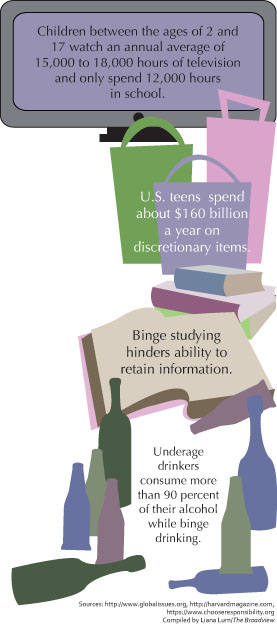Bingeing can lead to unhealthy lifestyle
April 30, 2015
Whether it be Youtube or Netflix marathons lasting from dusk to dawn, mass-consuming plates of food, or buying consumer products in bulk, the act of bingeing, excessively indulging in an activity, has become a daily facet in the lives of many teens.
While there is nothing wrong with reveling in a good television marathon or a lavish dinner every once in awhile to relieve a little stress, binge behavior can be detrimental to a student’s academic career, social life and health.
People usually binge to alleviate unhappiness, according to writer Nick English in an article featured by both Greatist and the Huffington Post. Binge behaviors have similar causes, the most common being stress, anxiety and depression.
But most of the time, relief is only temporary. Stress caused by academic or social problems can lead to binge behavior, but those problems will still exist until they are actively confronted.
The emphasis placed on having the latest goods — and information — can lead to binge behaviors. Twenty-five percent of teens acknowledged they were obsessed with having the latest goods, such as electronics or brand-name clothing, according to a Stage of Life survey.
Some binge behaviors can lead to a deleterious lifestyle, such as Binge-Eating Disorder, where one regularly, excessively eats without taking actions to counter the binge eating. About 1 to 5 percent of the general population is estimated to have BED, according to the National Eating Disorders Association.
Sometimes it can be very easy to begin a binge, despite the consequences. With Netflix offering around five to 10 seasons of a wide variety of shows, it is tempting to put off school work and social interactions as the desire to watch “just one more” episode becomes irresistible.
The urge to abandon all restraint and begin bingeing should not lead a student to neglect her commitments and duties. Bingeing in place of fulfilling responsibilities can have social and academic effects, especially if one’s peers are affected on a team or in a collaborative project.
The final weeks of school can be stressful as Advanced Placement and final exams approach, and it can be tempting to yield to the temptations of bingeing. A little reward is almost always okay after hard work, but when that small treat becomes a binge it is best to call it a day and move onto something else.










